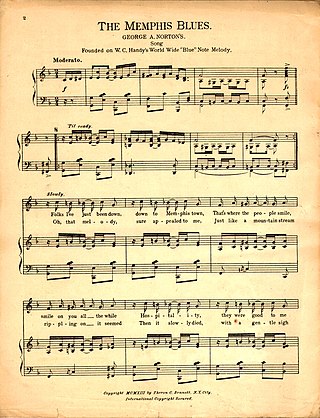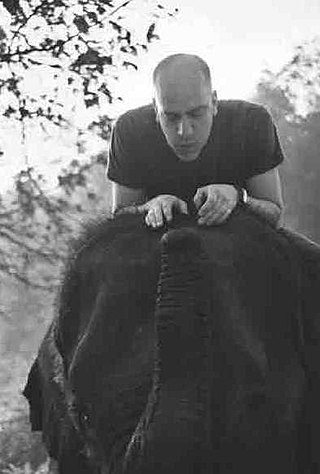Related Research Articles

Bluegrass music is a genre of American roots music that developed in the 1940s in the Appalachian region of the United States. The genre derives its name from the band Bill Monroe and the Blue Grass Boys. Like mainstream country music, it largely developed out of old-time string music, though in contrast, it is traditionally played exclusively on acoustic instruments and also has roots in traditional English, Scottish and Irish ballads and dance tunes, as well as in blues and jazz. It was further developed by musicians who played with Monroe, including 5-string banjo player Earl Scruggs and guitarist Lester Flatt. Monroe characterized the genre as "Scottish bagpipes and ole-time fiddlin'. It's a part of Methodist, Holiness and Baptist traditions. It's blues and jazz, and it has a high lonesome sound."

The Memphis blues is a style of blues music created from the 1910s to the 1930s by musicians in the Memphis area, such as Frank Stokes, Sleepy John Estes, Furry Lewis and Memphis Minnie. The style was popular in vaudeville and medicine shows and was associated with Beale Street, the main entertainment area in Memphis.

"When the Levee Breaks" is a country blues song written and first recorded by Memphis Minnie and Kansas Joe McCoy in 1929. The lyrics reflect experiences during the upheaval caused by the Great Mississippi Flood of 1927.

Maureen Ann "Moe" Tucker is an American musician and singer-songwriter who was the drummer for the New York City-based rock band the Velvet Underground. After they disbanded in the early 1970s, she left the music industry for a while, though her music career restarted in the 1980s, and continued into the 1990s. She has released four solo albums, where she played most of the instruments herself, and has periodically toured. She was inducted into the Rock and Roll Hall of Fame in 1996 as a member of the Velvet Underground.

R. L. Burnside was an American blues singer, songwriter and guitarist. He played music for much of his life but received little recognition before the early 1990s. In the latter half of that decade, Burnside recorded and toured with Jon Spencer, garnering crossover appeal and introducing his music to a new fan base in the punk and garage rock scenes.

Tav Falco's Panther Burns, sometimes shortened to (The) Panther Burns, is a rock band originally from Memphis, Tennessee, United States, led by Tav Falco. They are best known for having been part of a set of bands emerging in the late 1970s and early 1980s who helped nationally popularize the blending of blues, country, and other American traditional music styles with rock music among groups playing in alternative music and punk music venues of the time. The earliest and most renowned of these groups to imbue these styles with expressionist theatricality and primitive spontaneity were The Cramps, largely influenced by rockabilly music. Forming just after them in 1979, Panther Burns drew on obscure country blues music, Antonin Artaud's works like The Theater and Its Double, beat poetry, and Marshall McLuhan's media theories for their early inspiration. Alongside groups like The Cramps and The Gun Club, Panther Burns is also considered a representative of the Southern Gothic-tinged roots music revival scene.

Fat Possum Records is an American independent record label based in Water Valley and Oxford, Mississippi. At first Fat Possum focused almost entirely on recording previously unknown Mississippi blues artists. Recently, Fat Possum has signed younger rock acts to its roster. The label has been featured in The New York Times, New Yorker, The Observer, a Sundance Channel production, features on NPR, and a 2004 documentary, You See Me Laughin. Fat Possum also distributes the Hi Records catalog.
Fife and drum blues is an American folk music form derived from country blues, martial music tradition, and African rhythms. It is performed typically with one lead fife player and a troop of drummers. Unlike a drum corps, the drum troop is loosely structured. As such, a fife and drum band may have a variable number of snare, tom, and bass drum players. A large military-style bass drum is preferred. Fife and drum performances are often family affairs held at reunions, summer community picnics, and on holidays.

Transcendental Blues is the ninth studio album by Steve Earle, released in 2000. It features Sharon Shannon on the track "The Galway Girl". The album was nominated for a Grammy in the Best Contemporary Folk Album category.

Mark Feldman is an American jazz violinist.
Robert David Hole is an Australian slide guitarist known for his style of playing rock and roll and blues music.
Flying Emus are an Australian country/bluegrass band that formed in 1984 and released four studio albums, including, This Town, which won an ARIA Award for Best Country Album in 1988. They disbanded in 1990. At the Country Music Awards of Australia in January 2013, John Kane, announced they had reformed with other founders: his younger sister Genni Kane on lead vocals and guitar, Mike Kerin on violin and mandolin and Ian Simpson on banjo, joined by new member Michael Vidale on bass guitar.

Harry Smith's Anthology of American Folk Music, Volume 4 is a two-disc compilation of twenty-eight American folk recordings originally released on 78 rpm records between 1927 and 1940, issued in May 2000 on Revenant Records, catalogue #211. Compiled by experimental filmmaker and notable eccentric Harry Smith as the fourth album of his Anthology of American Folk Music set from 1952, it was never completed by Smith himself. While the CD is out of print, an LP version has been issued, along with the other three volumes, on the Portland-based Mississippi Records label.

The People's Choice: Music is an extended play by artists Komar and Melamid and composer Dave Soldier, released in 1997. The EP comprises two songs, "The Most Wanted Song" and "The Most Unwanted Song". The former, a pop duet, was written to incorporate lyrical and musical elements that were received favorably by most respondents to an opinion poll. "The Most Unwanted Song", meanwhile, features lyrical and musical elements that the same respondents most disliked. Accordingly, the track includes bagpipes, cowboy music, an opera singer rapping, and a children's choir that urged listeners to "do all [their] shopping at Walmart!"

David Sulzer is an American neuroscientist and musician. He is a professor at Columbia University Medical Center in the departments of psychiatry, neurology, and pharmacology. Sulzer's laboratory investigates the interaction between the synapses of the cerebral cortex and the basal ganglia, including the dopamine system, in habit formation, planning, decision making, and diseases of the system. His lab has developed the first means to optically measure neurotransmission, and has introduced new hypotheses of neurodegeneration in Parkinson's disease, and changes in synapses that produce autism and habit learning.

Charles Burnham is an American violinist and composer. He has a unique highly imaginative style that crosses genres, including bluegrass, delta punk, free jazz, blues, classical and chamber jazz. He often performs with a wah-wah pedal. He initially became renowned for his work on James "Blood" Ulmer's Odyssey album. The musicians on that album later performed and recorded as Odyssey the Band, sometimes known as The Odyssey Band. He was also a member of the String Trio of New York, and currently plays in the 52nd Street Blues Project, Hidden City, We Free StRings, Improvising Chamber Ensemble and the Kropotkins.

Jonathan Kane is an American musician and composer. Coming out of New York's Downtown Music scene of the early 1980s, Kane is known for his work with minimalist composers La Monte Young and Rhys Chatham, and was a founding member of NYC band Swans. He also leads his own minimalist blues band called Jonathan Kane's February.
The Soldier String Quartet was a string quartet, founded in 1984 by composer and violinist Dave Soldier, that specialized in performing a fusion of classical and popular music. The quartet proved a training ground for many subsequent experimental classical groups and performers, including violinists Regina Carter and Todd Reynolds, and performed at venues ranging from the classic punk rock club CBGBs to Carnegie Hall and the Lincoln Center.

Erin Harpe & the Delta Swingers are an American Delta blues band from Jamaica Plain, Massachusetts, United States. Formed in 2010, the group features founding members Erin Harpe and Jim Countryman.

Shake Hands with Shorty is the debut studio album by American band North Mississippi Allstars. It was released on May 9, 2000, through Tone-Cool Records. It features contributions from Cedric and Garry Burnside, Othar Turner, Jim Dickinson, Jimmy Crosthwait, Richard "Hombre" Price, Alvin Youngblood Hart, Steve Selvidge, Jimbo Mathus, Tate County Singers, Stu Cole and Greg Humphreys. Recording sessions took place in 1999 at Zebra Ranch Studios in Tate County, Mississippi, except for Price's bass part on the song "K.C. Jones " was recorded at House of Bob. Production was handled by Cody and Luther Dickinson.
References
- ↑ Ankeny, Jason. "The Kropotkins Biography". AllMusic. Retrieved 28 July 2016.
- 1 2 Krasnow, David (29 May 2001). "Music". Village Voice. Retrieved 28 July 2016.
- ↑ Soldier, Dave. "The Kropotkins" . Retrieved 28 July 2016.
- 1 2 Kozinn, Allan (28 July 1999). "One Life To Live? Composer Has More". New York Times. Retrieved 28 July 2016.
- 1 2 "Kropotkins". The New Yorker .
- ↑ Scherman, Tony (23 August 1996). "The Kropotkins Review". Entertainment Weekly. Retrieved 28 July 2016.
- ↑ van Tersch, Gary (26 May 2015). "The Kropotkins: Portents of Love". SingOut. Retrieved 28 October 2016.
- ↑ "Kropotkins @ issue project room 2/10". The New Yorker .